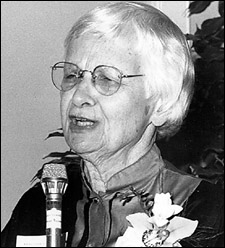Bunting papers given to Radcliffe
Radcliffe celebration honors papers and new Bunting biography by Elaine Yaffe
The Radcliffe Institute for Advanced Study recently celebrated the life and legacy of Mary Ingraham Bunting-Smith (1910 – 1998), known to the Harvard-Radcliffe community as Polly Bunting, president of Radcliffe College from 1960 to 1972. The event included remarks by Elaine Yaffe, author of “Mary Ingraham Bunting: Her Two Lives” (Frederic C. Beil, 2005), the first biography to be written about Bunting-Smith. Special note was made of the family’s gift of Mary Bunting’s papers to the Arthur and Elizabeth Schlesinger Library on the History of Women in America at the Radcliffe Institute. 
A geneticist by training with degrees from Vassar College and the University of Wisconsin, Bunting came to Radcliffe from Douglass College, the women’s division of Rutgers University where she had been dean for five years. Her first act was to create the Radcliffe Institute for Independent Study, an innovative program that offered fellowships to women who wished to resume their scholarship, writing, or artistic careers. This was Bunting’s pioneering response to what she deemed the “climate of unexpectation” for women. The program flourished and was renamed the Bunting Institute in her honor in 1978.
Perceiving that Radcliffe students were disadvantaged by their living arrangements, Bunting went on to create three residential houses (East, North, South) out of Radcliffe’s dormitories. She also appointed House masters, faculty associates, and tutors to provide support, advising, and enrichment. She authorized the building of Hilles Library to provide a central library and study center for the Radcliffe Quadrangle and a new house, Currier House.
She welcomed Harvard’s willingness to widen its portals and admit women directly to the Harvard Business School and to the Harvard Graduate School of Arts and Sciences in 1963 and closed
both the Harvard-Radcliffe Program in Business Administration and the Radcliffe Graduate School. In the same year Radcliffe diplomas were phased out and all students (A.B., A.M., and Ph.D) received Harvard diplomas.
In 1971, Bunting negotiated the “nonmerger merger” with Harvard, which introduced co-residential living in Harvard and Radcliffe colleges and led to the integration of extracurricular activities including the sports programs, the libraries, and some administrative offices. This paved the way for the eventual merger of Harvard and Radcliffe in 1999 and the formation of the Radcliffe Institute for Advanced Study.
Bunting went on to a third position in academic administration at Princeton University, where she served as special assistant to the president with responsibility for establishing the continuing education program. Additionally, Bunting had a distinguished career in public service, serving on a National Science Foundation committee in 1957 to study the drain of high school students from science, as chair of education on the President’s Commission on the Status of Women under President John F. Kennedy, and as the first biologist and first woman on the Atomic Energy Commission, serving from 1964 to 1965.
“Bunting’s personal papers and journals will enrich the existing holdings at the Schlesinger Library, which include her oral history, her papers as president of Radcliffe, and the papers of her mother, Mary Shotwell Ingraham. This treasure trove of personal and institutional records, along with Yaffe’s biography, will preserve the legacy of Radcliffe’s distinguished fifth president,” said Nancy F. Cott, the Carl and Lily Pforzheimer Foundation Director of the Schlesinger Library and the Jonathan Trumbull Professor of American History in the Faculty of Arts and Sciences.
– Radcliffe Communications




